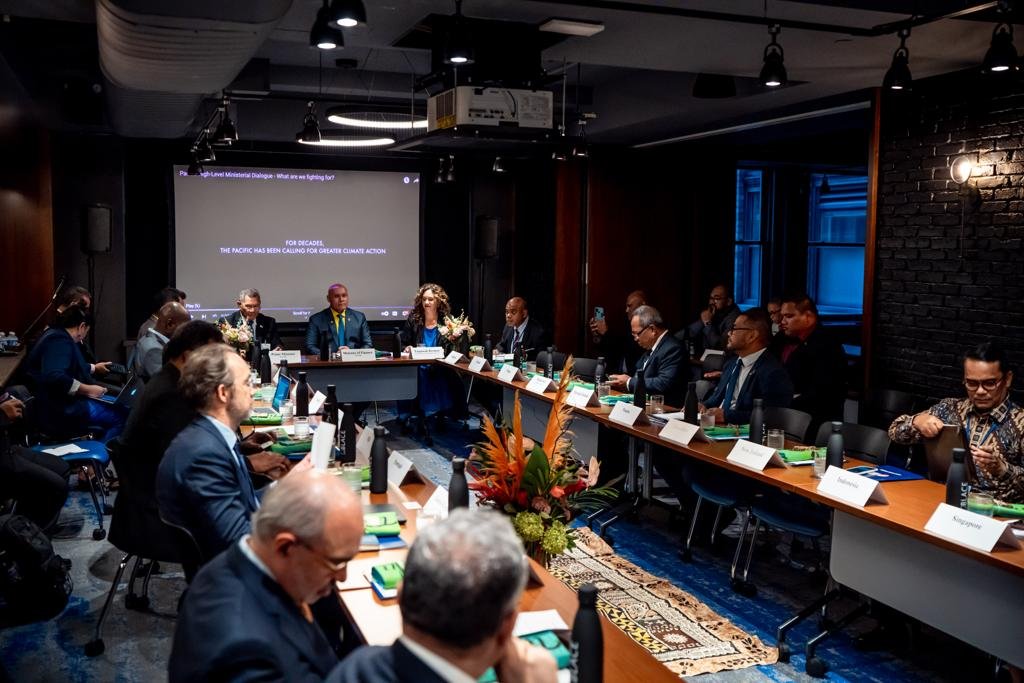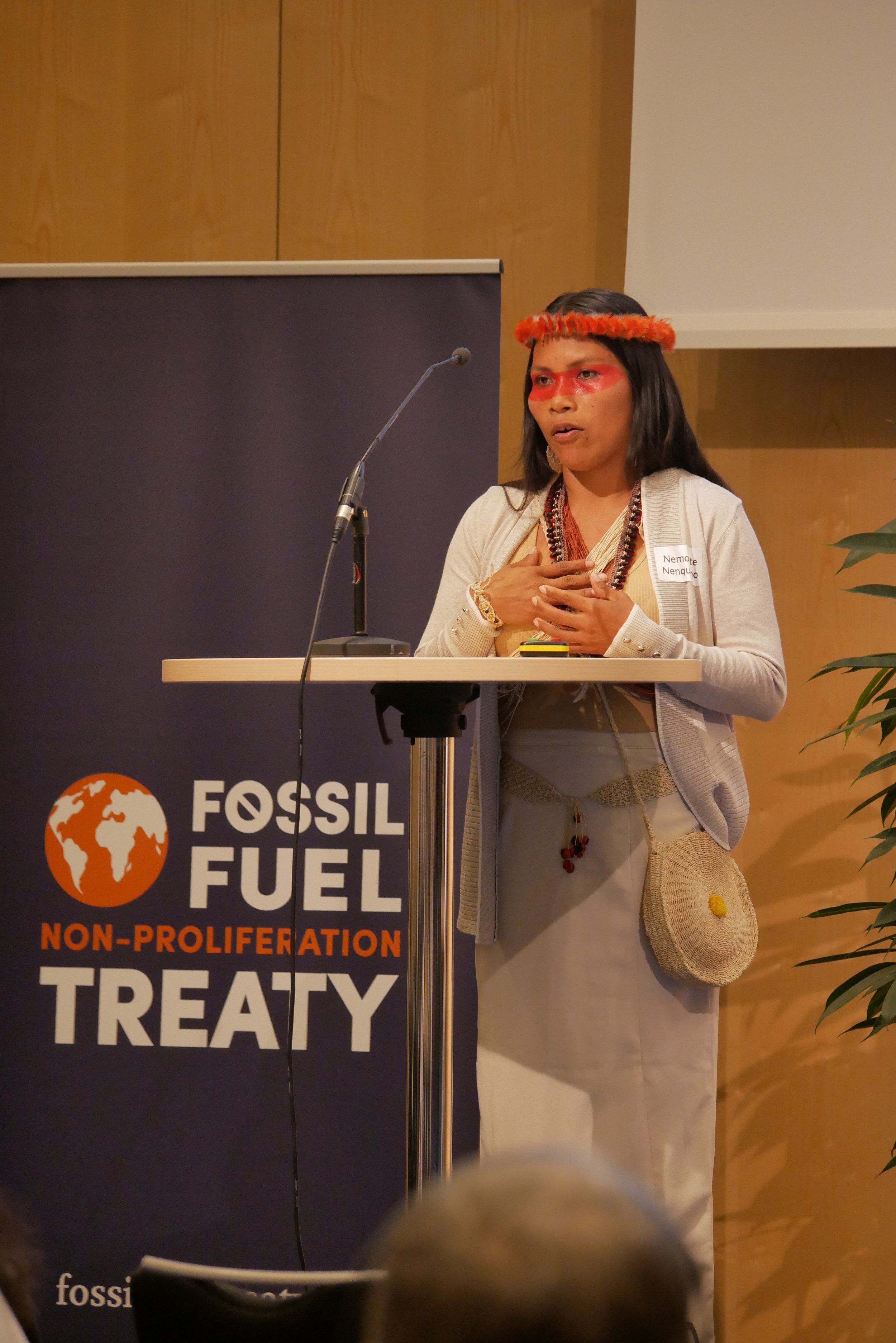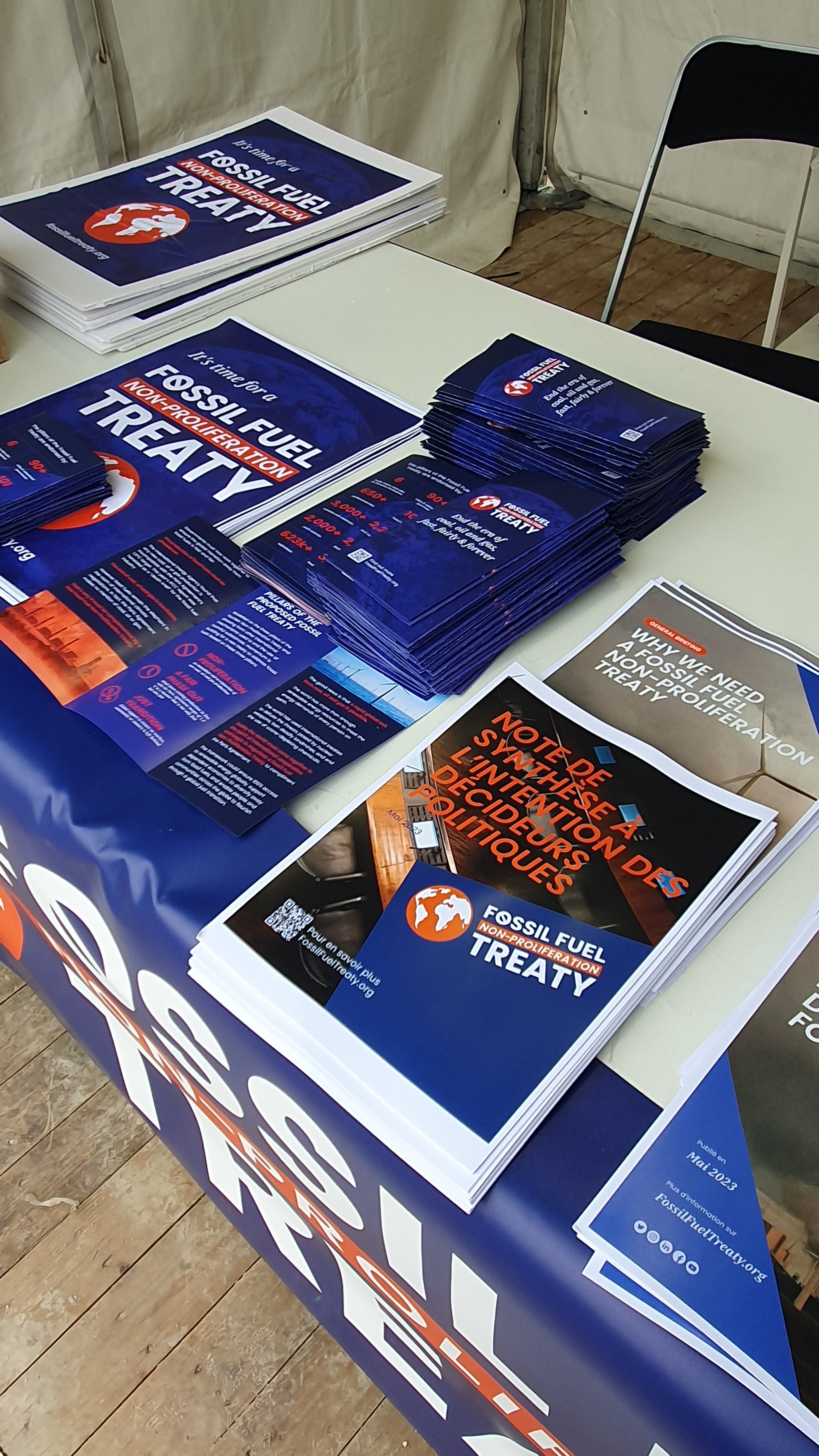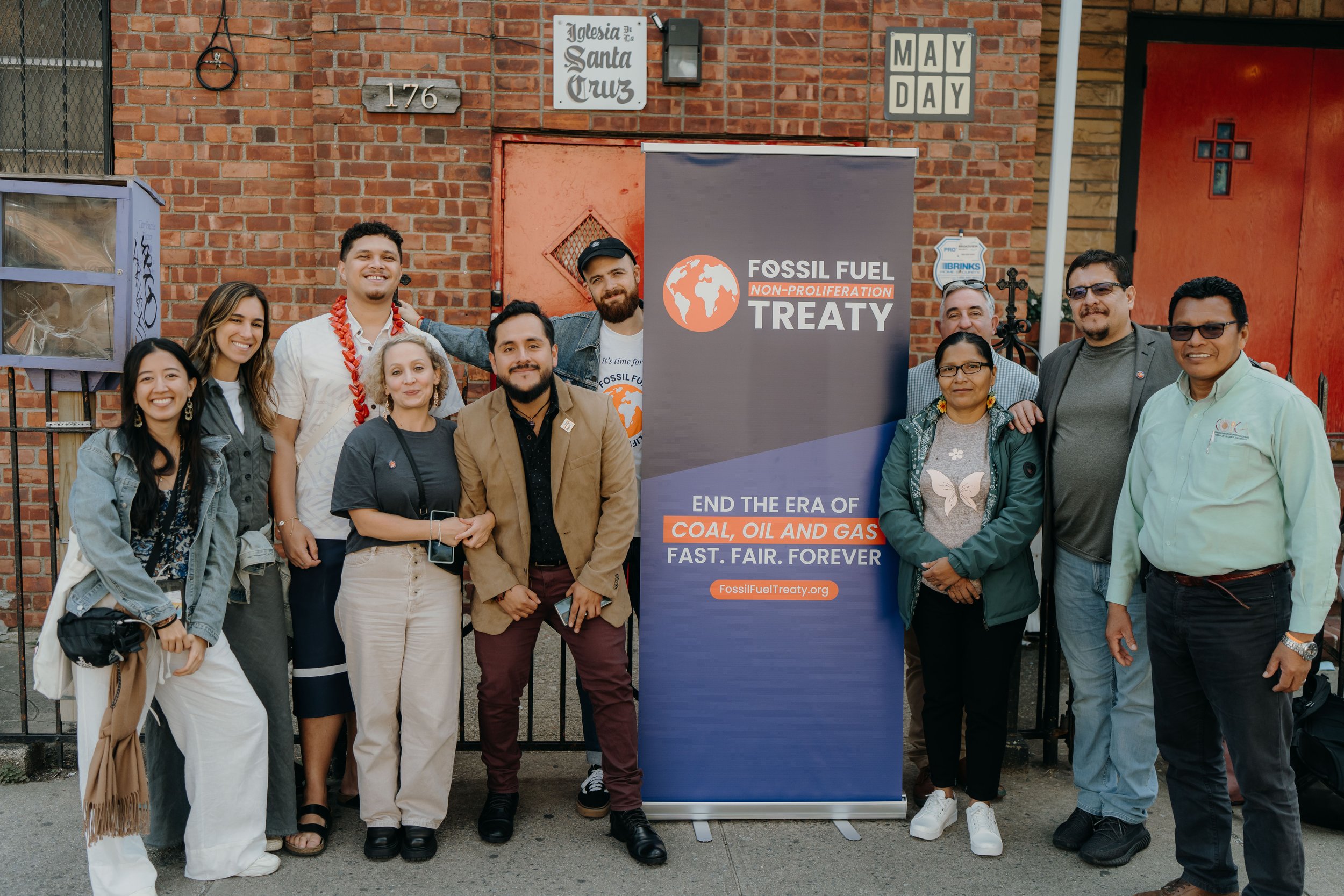
LONDON CLIMATE ACTION WEEK 2025
As fossil fuel expansion accelerates and climate progress stalls, Climate Weeks like London’s are essential to build pressure between COPs and turn bold ideas into real commitments. This London Climate Action Week, the Fossil Fuel Non-Proliferation Treaty network will gather decision makers, climate leaders, activists and artists to call for international cooperation to end the fossil fuel era.
London Climate Action Week: a critical moment to build momentum for a fossil fuel phase outAt London Climate Action Week, a growing global movement is calling to launch negotiations for a Fossil Fuel Non-Proliferation Treaty by 2026. The world cannot wait for COPs each November; Climate Weeks are essential to keep up the pressure, grow the movement, and push for real commitments between summits. The Fossil Fuel Treaty network will be present and hold several events to keep standing firm and end the fossil fuel era.
Our events at London Climate Action Week-

Standing Firm for Climate Action: Ending the Era of Fossil Fuels
Join Lena Estrada, Colombian Minister of Environment, Mete Coban, Deputy Mayor of London, Kumi Naidoo, President of the Fossil Fuel Treaty, Caterina Sarfatti, Managing Director at C40 Cities and Fiona Harvey, Environment Editor for The Guardian, for an urgent conversation on how we stand strong for climate action in the face of a renewed offensive from the oil and gas industry.
-

UK Network Strategy Session: Ending the Era of Fossil Fuels
As London Climate Action Week brings climate leaders and advocates from around the world to the UK capital, we’re taking the opportunity to reconnect and regroup with UK-based allies to strengthen our shared strategic thinking around the Fossil Fuel Non-Proliferation Treaty — a bold and achievable international response to a world on fire.
-

London Climate Action Week 2025: Gala Dinner
Kumi Naidoo, President of the Fossil Fuel Treaty initiative will be joining this exclusive dinner held by the Climate Innovation Forum. It will gather 320 leaders from the UK’s dynamic climate community and international guests to celebrate the seventh annual London Climate Action Week. Attendees will hear from inspirational climate pioneers and cultural performers in the stunning surroundings of London’s Guildhall.
The Fossil Fuel Treaty: an opportunity to turn momentum into actionIn the face of rising regressive climate politics and narratives, the Fossil Fuel Non-Proliferation Treaty offers a crucial response — and global momentum is growing behind it. It is the clear plan the world needs to phase out fossil fuels through an equitable transition. Led by frontline communities and funded by those most responsible. It’s not a distant goal. The shift has already begun.
-
2024 was the hottest year on record, and the first to exceed the 1.5°C threshold set by the Paris Agreement. This stark milestone signals an urgent truth: the window to prevent the most catastrophic impacts of climate collapse is rapidly closing, so denying the climate crisis is not an option.
This is not only a global phenomena: in the UK Spring 2025 has “broken historical climate records”, and has been the warmest and sunniest year since records began being collated. It is also the driest Spring since 1893, according to the country’s Environment Agency. The UK Met Office has warned that the country has a 50:50 chance of seeing temperatures reaching above 40°C in the next 12 years, as it did for the first time on record in 2022, and “temperatures several degrees higher than we saw in July 2022 are possible in today’s climate.” It also made clear that this is happening “because our climate continues to warm”.
But there is hope. Some governments are beginning to understand what a real energy transition means: ending fossil fuel dependence, not just shifting suppliers. They’re rethinking energy security at its root and taking bold steps to phase out oil, gas, and coal. Protecting our planet and our lives means breaking free from fossil fuels and ending the neo-colonial scramble for resources in the Global South. The door is open — now we must push it wide.
What leaders choose to do between now and 2030 will define our collective future and climate, and the Fossil Fuel Treaty Initiative offers a clear plan to manage a global transition away from fossil fuels. It is the missing tool to help the world shift from dangerous dependence on fossil fuel-producing countries by advancing a just and coordinated phaseout.
17 countries — including fossil fuel producers like Colombia and Timor-Leste, and most recently joined by Pakistan — are now engaged in discussions around the proposed Treaty. Together, they are exploring multilateral cooperation under three core pillars:
Non-proliferation: Stop new coal, oil, and gas projects.
Fair phase-out: Gradually reduce existing production based on each country’s historical responsibility and economic dependence.
Just transition: Ensure support and financing so that workers, communities, and countries are not left behind, avoiding the repetition of colonial and extractivist models.
The Fossil Fuel Treaty initiative is supported by a growing movement which includes former UN Secretary General Ban Ki-moon, the WHO, the European Parliament, over 4000 civil society organisations, over 3,000+ scientists and academics, 101 Nobel laureates, the hundreds of health professionals, a Vatican Cardinal and thousands of religious institutions, a growing number of grassroots organisations, 11 Amazonian Indigenous nations, thousands of youth activists, 130 cities and subnational governments around the world including UK cities such as London, Manchester, Birmingham, Edinburgh and Glasgow, more than 600 Parliamentarians across the world and a growing number of businesses.
-
London has taken new strides as a beacon of climate leadership.Under Mayor Sadiq Khan, the city has taken bold steps to phase out fossil fuels, invest in clean energy, and prioritize environmental justice. Since 2022, his endorsement of the call for the Fossil Fuel Non-Proliferation Treaty has signaled a strong commitment to global cooperation and a just transition that safeguards both people and the planet. Now, as the newly appointed Special Envoy for Fossil Free Cities for the Fossil Fuel Treaty Initiative, Mayor Khan will help accelerate the global shift away from fossil fuels and elevate the voice of cities at the forefront of the climate fight.
London Climate Action Week is a critical moment to build momentum for a fossil fuel phase out. The world cannot wait for COPs each November; Climate Weeks are essential to keep up the pressure, grow the movement, and push for real commitments between summits.
And in the UK, a growing number of diverse voices are already calling for a Fossil Fuel Treaty:
UNISON — the country’s largest union — as well as the University and College Union (UC) and the Bakers and Food Workers Union (BFAWU) are firmly backing the call for a national energy transition. A just and properly financed shift from fossil fuels to clean energy isn’t optional; it’s essential. Their support reinforces the urgent demand for a fair transition that protects workers and communities as the UK moves away from oil and gas.
Peaceful demonstrators swept across the UK, urging the government to commit to ending fossil fuels instead of criminalising people protecting our planet. While the Fossil Fuel Treaty Initiative was not involved in organising these actions, we stand in solidarity with people’s right to peaceful protest who are speaking out in this moment of crisis and catalysing change.
During a concert on World Environmental Day, Greater Manchester and Massive Attack also joined the call for a Fossil Fuel Treaty showing momentum keeps building in the UK with cities and artists coming together for a concrete solution to end fossil fuel destruction.
The Labour Government’s landmark pledge to end new offshore oil and gas licences is internationally important. This must not be rolled back in the face of pressure from President Trump’s anti-climate, ‘drill baby drill’ agenda and mobilisation of the far right behind the fossil fuel industry. This means that the UK government should not greenlight projects like Rosebank. This new field won’t lower fuel bills or boost energy supply - most of its oil will be exported - and UK taxpayers will cover most of the cost of developing it. Given the amount of emissions it will cause - more than the annual emissions of the world’s 28 lowest-income countries - and its incompatibility with the UK’s commitments to play its part in preventing catastrophic climate change, the case for rejecting it and all future oil and gas developments could not be clearer.
The Government’s initiative to launch a Global Clean Power Alliance focused on scaling up renewable energy could play a significant role, but must also address fossil fuel phase out to be a real bridge to a safer world.
But the UK must also take responsibility as a major financial hub and one of the world’s most influential nations — a member of the G7, G20, UN Security Council, and NATO and the world’s fifth largest historical emitter, the UK must support developing countries through scaled up finance and technology transfer and as a champion of a planned global fossil fuel phase out that leaves no-one behind.
As a global power and major financial hub, the UK must act to regulate the industry. UK banks have poured over $100 billion into fossil fuel “carbon bombs”, undermining the country’s climate credibility.
To align with its climate commitments and regain the trust of the international community, the UK must actively resist the regressive fossil fuel agenda gaining ground in the US under Trump. This means ending fossil fuel financing, supporting a just global transition and standing with countries working to advance a Fossil Fuel Non-Proliferation Treaty.
-
The UK helped ignite the Industrial Revolution—now it must help end the fossil fuel era.
Ending the era of fossil fuels by moving to society and an economy based on renewable energy and energy efficiency is critical for energy security will have major economic benefits for households and the UK Government’s own budget - according to the UK Government’s own figures, the cost of energy subsidies to mitigate the spike in gas prices caused by Russia’s invasion of Ukraine was £62.5bn between 2022-24 (and this doesn’t include the indirect costs to households caused by rising food and other essential goods). It is clear real UK energy independence will only come once the country ends its reliance on fossil fuels for power.
At London Climate Action Week, a growing global movement is calling to launch negotiations for a Fossil Fuel Non-Proliferation Treaty by 2026.
The Treaty offers a clear plan to phase out fossil fuels through an equitable transition—led by frontline communities and funded by those most responsible. It’s not a distant goal. The shift has already begun. Now it’s time to make it global, binding, and fair.
Momentum for a Fossil Fuel Treaty is building in the UKAcross the country, a growing number of diverse voices are already calling for a Fossil Fuel Treaty. From major cities like London and Manchester, to artists like Massive Attack and trade unions like Unison, powerful UK voices are calling on their government to actively resist the regressive fossil fuel agenda gaining ground in the US under Trump by standing with countries working to advance a Fossil Fuel Non-Proliferation Treaty.

London has emerged as a beacon of climate leadership. In 2022, the city endorsed the call for a Fossil Fuel Treaty and since then, Mayor Sadiq Khan and Deputy Mayor Mete Coban have only strengthened their support!19 June, 2025
Mayor of London and C40 Co-Chair, Sadiq Khan has been appointed as the Special Envoy, Fossil Free Cities for the Fossil Fuel Non-Proliferation Treaty Initiative.The new role is aimed at accelerating the global transition away from fossil fuels and amplifying the voice of cities in the fight against the climate crisis.
23 June, 2025
For Deputy Mayor Mete Coban, the Fossil Fuel Non-Proliferation Treaty represents both an economic opportunity and a pathway to advance social, racial, and economic justice—recognizing that the most vulnerable communities bear the brunt of the crisis. It’s also a crucial tool to ensure cities become cleaner, healthier, and more equitable for all.5th June, 2025
Greater Manchester Mayor and Massive Attack Endorse Fossil Fuel Treaty During Powerful Concert on World Environment DayMedia Briefings and Resources for London Climate Action WeekShort briefing notes that can help inform governments, cities and other decision-makers about the case for a Fossil Fuel Non-Proliferation Treaty. Want to organise for a member of the Treaty Support Team to join a briefing? Contact campaign@fossilfueltreaty.org
Contact us.-
For general enquiries contact info@fossilfueltreaty.org
-
For media and event enquiries contact media@fossilfueltreaty.org – this email is being monitored 24/7 by our global communications team.
-
For all other campaign enquiries contact info@fossilfueltreaty.org
-
For organisational partnerships and campaign inquiries contact partners@fossilfueltreaty.org and a member of our Global Partnerships team will reach out
Connect with us for live updates





















